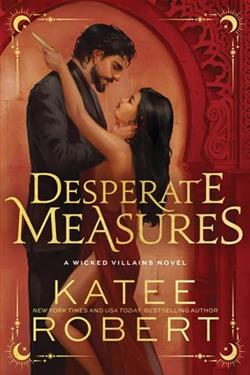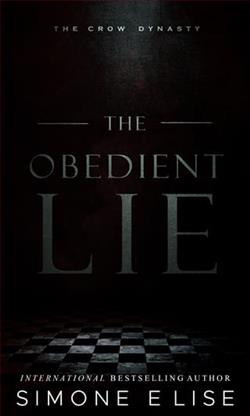Page 65 of The Promise of Jenny Jones
“Listen.” He dropped an arm around her shoulders and let her burrow into his side. “What happened to Jenny wasn’t your fault.”
“I asked God to punish her,” she mumbled against his waistcoat.
Instantly the conversation tumbled into deep water. Ty drew on the cigar, searching for answers as ephemeral as smoke, not sure if he could shape them into the form his niece needed to hear. If someone had inquired, he would have said he was a spiritual man but not religious. To him, God was a spark within every living thing, an artist who painted with sunset clouds and ocean mist, a sculptor shaping human clay, earthly soil, and distant stars. The way he saw things, God was the creator. Any dogma beyond that was nit-picking.
Never would he have believed that he might be called upon to interpret God for a child. He wondered if Robert had any inkling of how parenthood was going to change his life.
“Well, God doesn’t grant unjust requests.” All he could do was hope for the best. “You wanted Jenny punished for killing your mother, and that was wrong. So God ignored that part of your prayers.”
Graciela peered up at him. “But shedidget punished. She got shot, and she got knifed.”
“Well, I know that,” he said, floundering. “All right, just for the sake of discussion, let’s suppose that God punished Jenny because you asked him to.” Now what? “Did you tell God that you’d changed your mind? You did change your mind, didn’t you?”
She nodded solemnly, her gaze fastened on his face.
“Well, then. There you are. God turned things around by letting you be the person to save Jenny’s life.”
Graciela’s eyebrows soared. “I saved Jenny’s life?”
“She would have bled to death if you hadn’t sewed her up.”
She relaxed against his body like a dog he’d had once, going hot and limp on his chest. After several minutes of silence, she lifted her head. “Uncle Ty?”
“What?” He gazed at Jenny over her head.
“Sometimes I like Jenny,” she whispered.
“So do I.” The object of their discussion was snoring slightly, moaning softly every now and again. Smiling, he decided that any man who hankered after Jenny Jones lusted for reality, not fantasy.
“When I like her, it makes me feel bad inside because of my mama.”
With one sentence, she tossed him back into the deep water. Awkwardly, he patted her shoulder to soften his words. “Honey, you know Jenny didn’t kill your mother. Youknowthat. Your mother explained it, Jenny’s explained it, I’ve explained it. You’ve got to stop blaming Jenny. It isn’t fair to her.” Oh God, he’d made his niece cry again.
“Listen, it’s all right for you to like Jenny.” Pulling off his scarf, he pushed it into her hands. “Wipe your eyes. And your nose. It’s better if you like Jenny, because…” His mind jumped around like spit on a griddle, searching for a reason. “Because you own her now. She’s your responsibility.” And he’d been the one telling Jenny not to expect too much of a kid. Damn.
“What?” Wadding up his scarf, she pressed it against her wet eyes.
In for a penny, in for a pound. He drew a breath. “Not far from the ranch where your daddy lives, there’s a big town called San Francisco. In San Francisco, there’s a lot of Chinamen.”
“What’s a Chinaman?”
“Men who used to live in China. Across the sea. Never mind that part. These Chinamen believe if you save a person’s life, then you’re responsible for that person forever after, sort of like you own them.” Maybe it wasn’t the Chinamen who believed that, he wasn’t sure, but he’d heard it somewhere. “The important thing is, it’s good that you like Jenny. It’s all right to like her. It’s a lot better that way since you own her now.”
She hid her face behind his scarf, and he could almost hear her thinking. When she lowered the scarf, she was frowning. “Do you and Jenny own me? Because you saved me from my cousins with the snakes?”
This was getting complicated, and he wished he’d never mentioned it. “I suppose we do,” he conceded uneasily, irrevocably linking the three of them in her mind. This was a problem he’d worry about later.
When the train stopped to take on more passengers, he bought bowls of fiery stew for their supper, a loaf of fresh dark bread, and he refilled their canteens. After the train moved out again, Graciela wet a strip of her torn nightgown and gently wiped the sweat from Jenny’s face. Jenny roused briefly, murmured something, then slept again. Ty watched his niece adjust the shawl around Jenny’s shoulders and decided Jenny had been right and he had been wrong. Six-year-olds were capable of much more than he would ever have believed.
Graciela lifted his arm and nestled beneath it, resting her head on his chest. “Tell me a story.”
His eyebrows rose toward his hat brim, and he cleared his throat. “I don’t know any stories.”
“Tell me about when you and my daddy were little boys.”
“You don’t want to hear about that.” But she did, so hesitantly at first, then with growing pleasure, he told her about the time he and Robert had tried to steal Don Antonio Barrancas’s prize bull and how he’d gotten gored for his trouble. “Right in the butt,” he said, laughing. “Couldn’t sit for a week.” Then he told her how his mother had always baked an extra cherry pie because she knew her boys would steal one, and about the time he and Robert had sneaked out their bedroom window to sleep in the haystack but Cal caught them and blistered their behinds. He might have talked until midnight, remembering himself and Robert, except he noticed that she’d fallen asleep.
Trying not to wake her, he lit another cigar and gazed out the window as the train rolled through the desert night. Graciela was not his daughter, and Jenny was not his woman. But it felt good to watch over them while they slept as if they were his. He would have torn the limbs off anyone who came near them.















